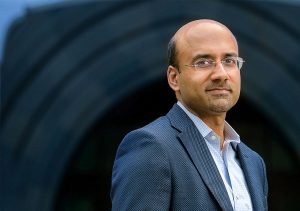Atif Mian: Theory, Practice, and Macro-economic Reality in a World Longing for Rebound
 “Economic disasters are almost always preceded by a large increase in household debt.”
“Economic disasters are almost always preceded by a large increase in household debt.”
The above proclamation comes from a critically acclaimed 2014 book, House of Debt, written by research colleagues Atif Mian, from Princeton University, and Amir Sufi, from the University of Chicago Booth School of Business.
The duo presented macro-economic theories linking major increases in personal debt with major recessions — then backed those theories up with hard data.
“We have a number of different explanations for what might be causing those booms and busts,” Mian told Equitable Growth in 2018, “what might be causing some countries to grow more aggressively than others. But our number of theories is much larger than the number of observations we have, which is a limiting factor of macro-economics just from an empirical standpoint.
“So, this is where I feel micro-data comes in, which is that it allows us to open up this space by giving us, in technical terms, a lot more degrees of freedom. And that can be used fruitfully and intelligently if you keep the theories in mind as you dive deeper into the more ‘micro’ level of granular datasets.”
The proliferation of micro-level data over the past decade has shown Mian the importance of understanding heterogeneity across datasets. “That really allows us then to connect finance to the macro-economy in a way that is much more based in actual data.”
The Pakistani native notes that global debt to GDP has almost doubled, with over $70tn in global debt accumulated since the ‘80s. Mian attributes unequal and unbalanced global growth as the root of the debt addiction. Covid is only going to further complicate matters.
“If you look at the responses to this crisis, it is often going to lead to an incredible increase in the levels of debt that households, governments and corporations are going to have,” Mian said in an interview with Adil Najam, the inaugural dean of the Pardee School of Global Studies. “It’s very hard at that point in time to run macro policy the usual way.”
Interest rates have already hit rock bottom and investor coffers are running low, and Mian sees a return to normal as “close to impossible”. A massive restructuring of the financial system would be the only viable solution at this point, he believes.
Personal debt in a post-Covid world, according to Mian, will result in income shocks, layoffs or reduced salaries, forcing households to make adjustments that work against the overall economy. Local governments and businesses will be feeling the same pinch, and implementing similar measures. Mian calls for a collective restructuring of debt levels: “Some of it will have to be written-down, some restructured into debt of different maturities.”
Mian has been warning about the downward spiral that out-of-control debt foretells. Covid could hasten that — depending on policy response. Without a restructuring of debt, the danger of economic contraction could become more prevalent, he fears. He worries about families already stretched thin by lower incomes, uncertainty and debt.
“When [faced with] these kind of squeezes before this crisis, the typical response of policymakers effectively has been to somehow try to give them even cheaper credit,” he says. “That cycle is going to be almost impossible to pursue this time round.
“We’ve been kicking this can down the road by ramping up more and more on credit creation, and letting people binge on credit. Either them borrowing themselves or governments borrowing on their behalf, effectively.”
Mian says the trend of unequal economic growth has been gathering steam over the past 30 to 40 years, with a select few benefiting. “That process is fundamentally unsustainable at a global macro level. The creation of credit is the other side of the process that is generating this unequal growth.”
Indebted countries with greenback balances will have to seek alternatives to the traditional repayment plan of boosting revenues through exports. Mian predicts that path will be become more precarious due to the pandemic. Many countries will find it neither possible nor advisable for the IMF to intervene and “roll-over existing debts” — unlike other recent situations.
“I think it would help if the global economy comes together more in the spirit of the Marshall Plan,” Mian says, referencing the $15bn US programme that helped to finance European recovery after World War II.
For realistic recovery, Mian would like to see “more avenues of risk-sharing, where the richer countries lessen some of the burden of the poorer countries”.
You may have an interest in also reading…
Thomas Kaplan: Building Bridges with Art
He has more Rembrandts – eleven paintings and two drawings – than any other private art collector. Billionaire investor, philanthropist,
Mitsuko Tottori: Flying High at Japan Airlines
Mitsuko Tottori, a name synonymous with resilience, dedication, and a groundbreaking ascent in the aviation industry, has become the first
Ursula Burns: Driving Change at Xerox
Ursula Burns has a certain prominence in our minds because she became the first African-American woman to run a Fortune


















































































